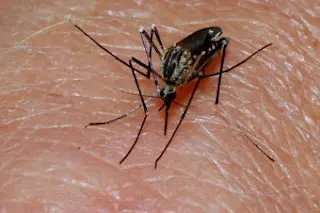Image: Flickr/dr_rellingAnyone who's ever watched Jurassic Park knows that blood-sucking insects can, in principle, be sources of DNA of their prey. But how reliably? Can living insects, perhaps, be sources of DNA evidence used to solve crimes? Well, according to this study, they can! Here, scientists collected mosquitos from two homes, as well as saliva samples from the people who lived there. From 26 female mosquitos, the scientists were able to collect DNA profiles of 11 people that correlated with the saliva samples. The evidence was strong enough for the scientists to urge investigators "to collect these insects indoors where crimes were committed, because it may be possible to find intact genetic profiles of suspects ... for later comparison to identify an offender and/or exclude suspects." This just might be the first reason I've heard of to be happy your home has mosquitoes.Trace samples of human blood in mosquitoes as ...
Human blood from a mosquito's lunch can be used as forensic evidence.
Discover how a forensic investigation tool using mosquitoes can provide vital DNA evidence from crime scenes. Learn more about genetic profiling.
More on Discover
Stay Curious
SubscribeTo The Magazine
Save up to 40% off the cover price when you subscribe to Discover magazine.
Subscribe













